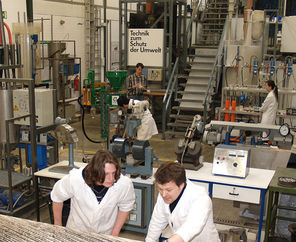Diversity in Research and Teaching
With its roots dating back to the "Harz mountain educational institute" founded in 1775, the Technical University of Clausthal boasts extensive experience in both research and teaching. Its work focuses on the areas of energy and raw materials, natural and materials sciences, economics, mathematics, computer sciences, engineering and process engineering. On the research side, there are three innovative centres: the Energy Research Centre of Lower Saxony (EFZN), the Clausthal Centre of Materials Technology (CZM), and the Centre of Simulation Sciences (SWZ).
Research on future energy sources: EFZN
Engineers, natural scientists, social scientists and economists all work together across different disciplines to solve specific problems at the EFZN. A good example is the transdisciplinary project "Base-load electricity from the North Sea" by the working group on wind energy at the Technical University of Clausthal. The proposed offshore wind farms would enable Germany to generate more wind power. Measurements have shown that 3000 to 4000 full-load hours of wind per year are available for energy production in selected areas of the North Sea. But there are also windless periods. And this is exactly where EFZN researchers come in; their aim is to find a way to ensure that a constant supply of power - a so-called base-load - is available at all times.
Open-minded and international
The Technical University of Clausthal has numerous long-standing international contacts. More than a third of its students and doctoral candidates come from outside Germany, making it Germany's "most international" university. This is also reflected in the university's research and teaching activities by the number of international research projects, joint degree courses with non-German universities, worldwide collaborations and visiting scientist programmes. The Technical University of Clausthal works together - interdepartmentally or at faculty level - with universities in other EU countries and with universities in Egypt, Argentina, Brazil, Chile, China, Korea, South Africa and the USA.
CUTEC Institute: Bridge between science and economy
As a result of the activities of the Technical University of Clausthal the Clausthal Institute of Environmental Technologies, better known as CUTEC, was founded in 1990. As a non-university affiliated research institute, CUTEC operates at the interface between science and industry both nationally and internationally. Its mission is to perform research and to conduct continuing education and training in the field of environmental and energy technology. Research at CUTEC is oriented toward application. To this end, it pools core competencies in the management of mobility, of recycling and waste, and of energy and supply. In conjunction with the process engineering disciplines, the institute established the sustainability management cluster, which evaluates the technological developments/findings in terms of economy and ecology. In ongoing research projects, scientists at CUTEC are currently working on scrap-metal recycling, biomass fuels, use of regenerative energies, fuel-cell reformer systems as well as pollutant and sludge reduction.
The Technical University of Clausthal, EFZN and CUTEC collaborate closely on a number of research ventures including broader comprehensive cooperation initiatives and BMBF-funded projects. Since their respective expertise in the field of energy and resource efficiency complement each other's ideally, all three also participate in research partnerships with companies like Volkswagen.






